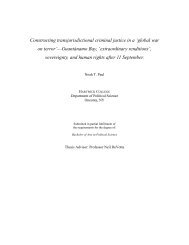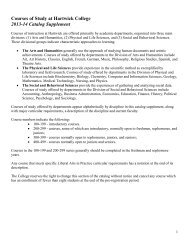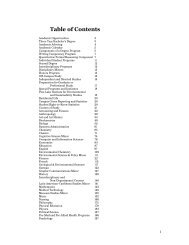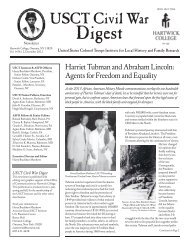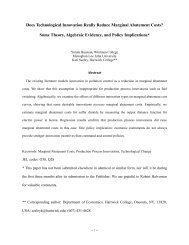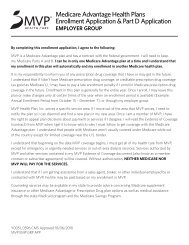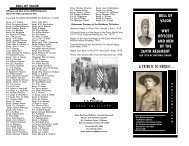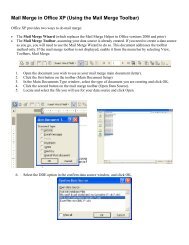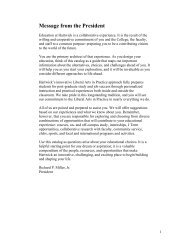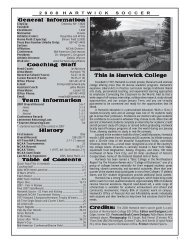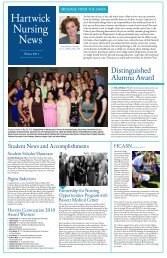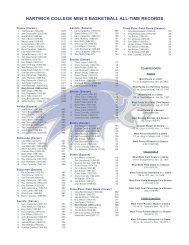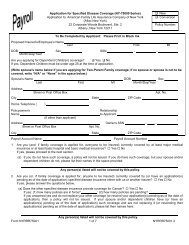Table of Contents - Hartwick College
Table of Contents - Hartwick College
Table of Contents - Hartwick College
You also want an ePaper? Increase the reach of your titles
YUMPU automatically turns print PDFs into web optimized ePapers that Google loves.
or 109; Math 233; Phys 140, 141 or 201, 202 (or by permission <strong>of</strong> the<br />
instructor). Chem 303 is a prerequisite to 304. (LAB)<br />
391 Junior Research (5 seven-hour labs weekly, January Term) A full<br />
time research course. Each student shall work full time on a laboratory<br />
research project at the junior level, developed in collaboration with a<br />
member <strong>of</strong> the chemistry faculty, or a person approved by the chemistry<br />
faculty, at some outside research agency. The project includes laboratory<br />
work, reading and oral reports on papers in the primary chemical<br />
literature, oral and written reports on the work done. Prerequisite:<br />
permission <strong>of</strong> the Department <strong>of</strong> Chemistry (LAB)<br />
392 Junior Year Research (2 credits) Each student shall work the<br />
equivalent <strong>of</strong> one afternoon per week during the two regular terms on a<br />
laboratory research project associated with a member <strong>of</strong> the chemistry<br />
faculty. Prerequisite: permission <strong>of</strong> the Department <strong>of</strong> Chemistry.<br />
404 Instrumental Methods <strong>of</strong> Analysis (5 credits) (3 one-hour<br />
lectures, 1 four-hour laboratory weekly) The theory and use <strong>of</strong> modern<br />
instrumentation in analytical chemistry. Topics include methods based<br />
upon absorption <strong>of</strong> electromagnetic radiation, chromatographic<br />
separations and mass spectrometry. Laboratory emphasizes hands-on use<br />
<strong>of</strong> analytical instrumentation. Prerequisites: Chem 203, 303. (LAB)<br />
405 Physical Organic Chemistry (5 credits) (3 one-hour lectures, 1<br />
four-hour lab<br />
weekly) Methods <strong>of</strong> determining reaction mechanisms. The principles <strong>of</strong><br />
thermodynamics, kinetics and quantum mechanics are used to determine<br />
the reaction pathways <strong>of</strong> organic chemicals including concerted<br />
electrocyclic reactions, acid and base catalyzed reactions, substitution<br />
reactions and elimination reactions. Prerequisites: Chem 201, 202, 303,<br />
304. Offered on petition <strong>of</strong> at least three students. (LAB)<br />
410 Advanced Inorganic Chemistry (3 credits) (3 one-hour lectures<br />
weekly) Modern theoretical and descriptive inorganic chemistry with<br />
emphasis on physical and chemical principles. Prerequisites: Chem 303,<br />
304.<br />
450 Selected Topics in Advanced Chemistry (3 credits) (3 one-hour<br />
lectures weekly) Topics studied selected according to interest and needs <strong>of</strong><br />
individual students. Topics could be in any field <strong>of</strong> chemistry covered by<br />
our faculty including analytical, biological, environmental, inorganic,<br />
organic, or physical chemistry. Possible topics include polymer synthesis,<br />
natural compounds, medicinal products, quantum mechanics, chemical<br />
applications <strong>of</strong> group theory, electrochemistry, radiochemistry,<br />
contaminant remediation, hazardous waste treatment, toxicology, and<br />
atmospheric chemistry. Subjects examined in depth by discussions,<br />
reading, and problems with emphasis on current literature. Prerequisites:<br />
Based on topic and in consultation with instructor. Offered on petition <strong>of</strong><br />
at least three students.<br />
491 Senior Thesis Research (1 credit) (1-semester course) A<br />
semester-long research project. The student must develop an original<br />
research idea into an oral and written research proposal to be approved by<br />
the chemistry department.<br />
492 Senior Research II (4 credits) (5 seven-hour labs weekly, January<br />
Term) A full-time research course. Each student shall work full time on a<br />
laboratory research project at the senior level, developed in collaboration<br />
75



